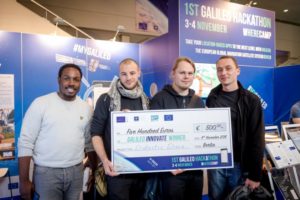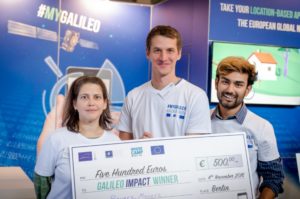The first ever European GNSS Agency (GSA) Galileo Hackathon brought together teams of passionate coders and geo enthusiasts from around the world to compete for some impressive prizes. The venue was Berlin’s Beuth University of Applied Sciences on 3 and 4 November during the sixth WhereCamp ‘unconference’ dedicated to geolocation enthusiasts and professionals. All the Hackathon competitors received a Galileo-ready BQ Smartphone and a certificate, while the two winning teams also each collected a €500 cash prize.
WhereCamp Berlin on 3 and 4 November was the place to be for movers and shakers shaping the future of Location Based Services (LBS) and Geo-IoT (Geolocation in Internet of Things). The first Galileo Hackathon was a unique opportunity to showcase coding skills, connect with the Geo-IoT app development community, and to gain a competitive insight on what Galileo LBS will be bringing to the smartphone in your pocket in the very near future.
The Hackathon was open to any individual or small team interested in developing new applications using Galileo: Europe’s Global Navigation Satellite System (GNSS). The challenge for the hackers was to come up with an innovative application that makes full use of the Galileo’s unique capabilities in less than 24 hours. There were no limitations on the types of applications that could be created.
“The aim of the Hackathon for the GSA is to better engage with the app developer community,” explained Justyna Redelkiewicz from GSA. “With the imminent launch of Galileo Initial Services and the recent initiatives that enable developers to more easily access raw GNSS data on Android phones there are some really exciting opportunities for new and powerful LBS applications.”
There were two main prizes up for grabs: one for the most innovative Galileo-based app and one for the most impactful Galileo-based app.
Dawning of Aquaris
The Hackathon was officially launched with an early afternoon briefing session on 3 November, which included an overview of the Galileo-enabled BQ Aquaris X5 Plus smartphone – the first European smartphone with Galileo capability – and the hardware that the teams would be working with.
Alvaro Fructuoso of BQ described the phone’s capabilities and specification. At the heart of the phone is the Qualcomm Snapdragon 652 chip that provides a true multi-constellation experience. The chip is using Galileo and this ability to access more satellites and better signals means improved location accuracy and faster time to first fix (TTFF).
After the briefing four enthusiastic teams got down to coding business fortified by GSA-supplied pizza and drinks with some teams working literally overnight to brainstorm ideas and then deliver their code. Technical support was available for all the teams through experts from the Joint Research Centre (JRC), BQ and technical universities from Nottingham and Berlin that covered support on both hardware and software levels as well as GNSS and Galileo specific questions.
Following 24 hours of hard work, each team had just five minutes to present their ideas and demonstrate their concept. The teams were judged on a set of criteria that included the level of innovation shown, the impact or potential of the idea, the feasibility and sustainability of the concept, its relevance to Galileo and the amount of progress made during the Hackathon.
The first team to present was ‘Galileo 7’ with team members Dierk Eichel, Damien Michaudet and Jan De Vries their idea was a Pokemon Go type game called ‘GrossStadtWild Go’ where players could monitor and tag the wildlife they encounter in urban environments. The game had a social networking aspect in that it enabled users to exchange information on the location of wild animals in their city.
Second on stage was a multi-national team called ‘Rovers_Movers’ with a trio of members from three different continents: Tarun Devrant from India, Friedger Müffke of Germany, and Diana M. Cerviño from Venezuela. Their app – Life Watch – aimed to safeguard neighbourhoods by creating citizen awareness and rewarding action for the public good. The improved accuracy of Galileo could enable a quicker and more accurate response to any suspicious event in the area.
Third to present was the team that created the ‘Didactic Disco’ app, consisting of five members: Wolfhard Fehre, Stephan Brandt, Niklas Bartz, Tobias Seydewite and Daniel Hatton-Johnson. Their app was a multi-player game for drawing on maps that used player movements in an urban environment to create images. The app – demonstrated live – combined social networking and mapping.
Last to demonstrate their work was team ‘Semicolon’ with team members Mohammed Elsharif and Kazunari Okuda. Their proto-app was called Otoko that means ”a man” in Japanese. This app focused on the added value of Galileo in terms of precision in positioning and was a voice-assisted guidance concept for blind or visually impaired citizens.
Innovation and Impact
A seven person judging panel consisted of Cristina Comunian from GSA, Jacopo Ovarelli from Alpha Consult, Michele Bavaro from JRC, Lukasz Bonenberg from Nottingham University, Mark Lützner of Spacetec, and Alvaro Fructuoso and Olaja Segovia from BQ.
After some serious deliberation the winners were announced at the penultimate session of the Wherecamp event just before lunch on 4 November. GSA’s Justyna Redelkiewicz introduced the jury and praised all the competing teams – it had been a tough decision.
The winner of the most innovative app was announced by Alvaro Fructuoso of BQ with the prize going to the Didactic Disco multi-player map game. He described the app as “a fun map drawing game, but one that had potential for serious use too.”
Cristina Comunian of GSA proclaimed the Rovers_Movers team’s neighbourhood watch app as the concept with most potential to make an impact on society saying that the app “could help bring communities together again – it was great that Galileo can enable this sort of thing.”
Congratulations to all the winners and competitors! The event was a great success and plans are in hand for a second Hackathon in the near future.



Pingback: Europe’s New Satellite System Will Improve Your Phone – more backlinks info's
Pingback: Galileo, la apuesta de la Unión Europea contra el GPS de EEUU, abre su señal al público – Insurance